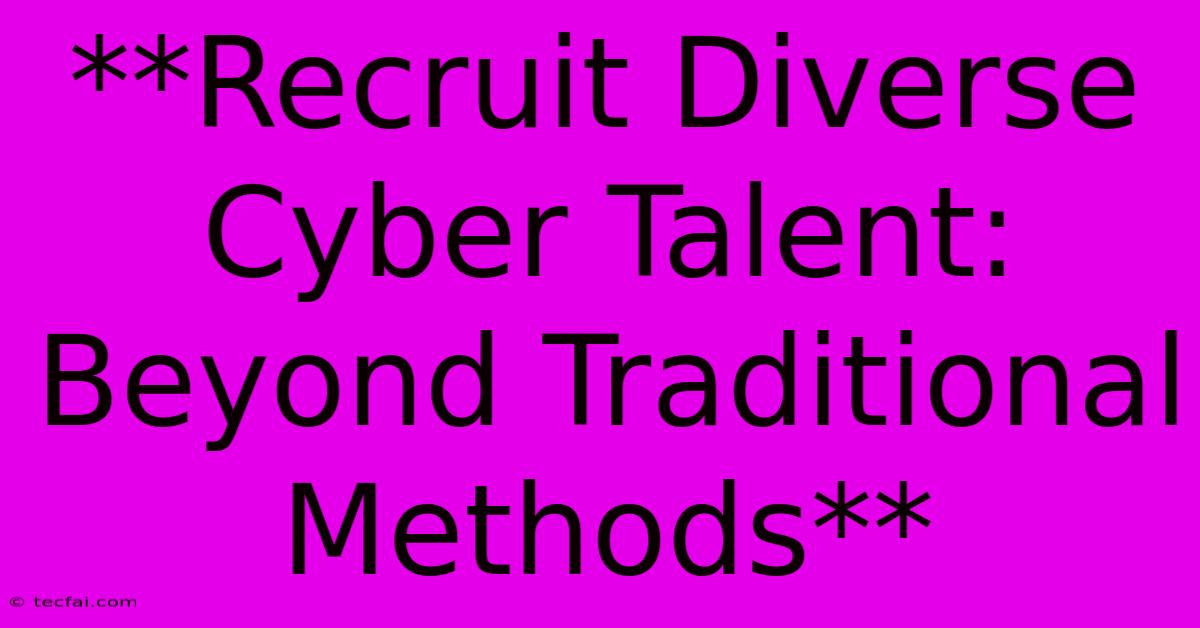**Recruit Diverse Cyber Talent: Beyond Traditional Methods**

Discover more detailed and exciting information on our website. Click the link below to start your adventure: Visit Best Website tecfai.com. Don't miss out!
Table of Contents
Recruit Diverse Cyber Talent: Beyond Traditional Methods
The cybersecurity industry is facing a critical talent shortage. In addition to the sheer number of unfilled positions, there's a pressing need for greater diversity within the workforce. To address this, organizations must move beyond traditional recruitment methods and embrace innovative strategies that tap into a wider pool of potential talent.
The Need for Diverse Cyber Talent
Diversity in cybersecurity is more than just a matter of representation; it's a strategic imperative. A diverse workforce brings different perspectives, experiences, and skillsets, leading to:
- Enhanced Problem Solving: Diverse teams are better equipped to identify and address complex security threats from multiple angles.
- Improved Innovation: A range of backgrounds and viewpoints fosters creative solutions and groundbreaking approaches to cybersecurity challenges.
- Increased Resilience: A diverse team is more likely to adapt to changing threats and emerging technologies, ensuring long-term cybersecurity success.
Traditional Recruitment Methods Fall Short
Traditional methods like job boards and university recruitment often fail to attract diverse talent. These methods rely on:
- Limited Reach: They primarily target candidates who actively seek employment, potentially overlooking passive talent and underrepresented groups.
- Bias in Job Descriptions: Using overly specific requirements or jargon can unintentionally exclude individuals with valuable skills and experiences.
- Homogenous Networks: Relying on referrals from existing employees can perpetuate existing biases and limit the diversity of the applicant pool.
Beyond Traditional Recruitment: Innovative Strategies
To attract a diverse range of cyber talent, organizations need to adopt a more inclusive and strategic approach. Here are some innovative strategies:
1. Expand Your Networks:
- Attend industry events specifically focused on diversity and inclusion. This will expose you to a wider pool of potential candidates from underrepresented backgrounds.
- Partner with organizations promoting diversity in STEM fields. Collaborate with groups like Women in Cybersecurity (WiCyS) or the National Society of Black Engineers (NSBE) to connect with qualified candidates.
- Develop relationships with Historically Black Colleges and Universities (HBCUs) and other minority-serving institutions. These institutions offer a wealth of untapped talent in cybersecurity.
2. Rethink Your Recruitment Process:
- Craft inclusive job descriptions: Avoid gendered language, eliminate unnecessary requirements, and focus on the essential skills needed for the role.
- Use blind recruitment: Remove identifying information like names and educational backgrounds from applications to reduce unconscious bias in the screening process.
- Implement diversity training for recruiters and hiring managers: Educate them on unconscious bias and best practices for inclusive recruitment.
3. Build a Culture of Inclusion:
- Create an inclusive workplace environment: Encourage open communication, support mentorship programs, and offer flexible work arrangements to attract and retain diverse talent.
- Invest in employee development: Provide opportunities for professional growth and skill development to empower diverse employees to succeed.
- Celebrate diversity: Showcase the contributions of your diverse employees and recognize their achievements to create a welcoming and inclusive culture.
Conclusion
Recruiting diverse cyber talent requires a deliberate and proactive approach that goes beyond traditional methods. By expanding networks, reevaluating recruitment practices, and cultivating an inclusive workplace culture, organizations can attract and retain a diverse workforce that is essential for building a secure future.

Thank you for visiting our website wich cover about **Recruit Diverse Cyber Talent: Beyond Traditional Methods** . We hope the information provided has been useful to you. Feel free to contact us if you have any questions or need further assistance. See you next time and dont miss to bookmark.
Featured Posts
-
Le Bron James Bagong Rekord Sa Nba
Nov 07, 2024
-
Luton Town Vs Cardiff City Live Updates
Nov 07, 2024
-
Crvena Zvezda Loses To Barcelona 2 5
Nov 07, 2024
-
1000 Ethereum Investment 2018 Vs 2023
Nov 07, 2024
-
Post Win Trump Supporters Reveal Agenda
Nov 07, 2024
